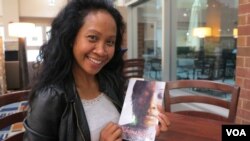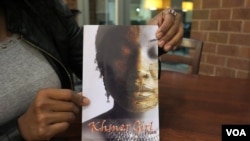Born to parents who fled the upheaval brought about by the coming to power of the Khmer Rouge regime in the early 1970s, Peou Tuy, a spoken word poet, was four years old when she was accepted as a refugee in the United States.
Born in Battambang province in the final days before the regime fell in 1979, Tuy spent her early years in Thailand’s refugee camps before moving to the U.S.
About 100,000 Cambodian refugees moved to the U.S. around the time that Tuy and her family were beginning a new life. Many ended up in areas with high rates of crime and poverty.
Growing up in Lowell, MA, Tuy struggled with identity issues. “I went through the process of not loving who I was, not loving being Khmer and struggling with the dynamics of being Khmer and Khmer American,” she said.
She suffered period of deep depression and low self-esteem. Her sister, who was of a lighter skin tone, would taunt her for her dark complexion, which is often seen as less attractive in Khmer society.
Her mother and sister would insist she use skin-whitening products, adding to her self-image problems and her father ran a strict conservative household.
In the early 2000s Tuy left home for college without her parents’ permission and their relationship hit the rocks.
“We didn’t really talk for a long time. I moved myself out of my family home and the Khmer community. I had a lot of self-doubt, and depression – not understanding the Khmer culture and not being able to communicate my feelings,” she said.
But Tuy has found an avenue to deal with her pain through poetry. In 2014 she published her autobiography, “Khmer Girl”, an account of her journey from Cambodia.
In 2005, Tuy had an abortion after she was raped by a friend. “I never accepted it. I never forgave myself or forgave him,” she said.
The episode sparked a fresh bout of depression, before last year she found solice after listening to a friend speak at a seminar about forgiveness.
“I just kept crying, crying, and crying and all of a sudden thought, I need to forgive myself because if I don’t forgive myself, there is no way that I can move on and embrace where I was at,” she said.
Today Tuy organizes workshops in the community to teach people about the effects of trauma, healing and self-worth.
Through reading her poems to students at high schools and universities, as well as in the Cambodian diaspora community, Tuy has been able to find purpose in life.
“When I started to do the trauma and healing workshop, the reconciliation came because a lot of young Khmer women would come up to me and say, ‘how do you do this? How do you write? How do you express your feelings?’ It made me feel that I had a purpose,” she said.
Tuy is currently working on a children's book project and continues to speak about healing and self-worth.









